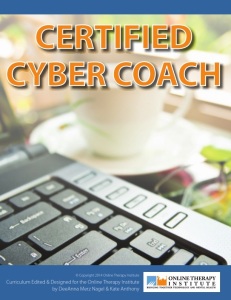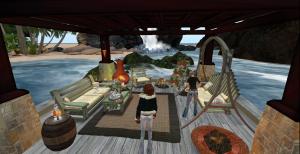I’ve been having a think about how clients need varying levels of support in their lives at different times, and how online services can meet those needs. Sometimes a forum with no interaction by the client is enough – they can learn from previous posts about how others coped in challenging times. Sometimes, the need steps up to receive communication from another human being about an issue, and this can be done through anonymous support forums or chat rooms. Perhaps an ongoing relationship would be helpful, and a less anonymous contract for therapeutic help would be useful from a trained counsellor or psychotherapist. Perhaps that contract can in turn be stepped up to include face-to-face sessions in-room as part of a blended care package.
In short – the levels of support and contact a person needs is a fluid thing! So why not also apply this to training?
At the Online Therapy Institute, we pride ourselves on our attitude to training being a personal thing. Each of our students gets one-to-one mentoring from myself or DeeAnna, depending on what the student wants or needs to learn about (and our training catalogue is extensive and diverse!). We build a personal relationship with each student to ensure their training needs are fully met, and we have found this to be the most enjoyable process in continuing professional development for both parties. Our training model lies in the training relationship being as central to the process as the therapeutic relationship will be to their future client base. The key to learning is in the writing, and the essence of the learning being valuable comes from the personal mentoring that reflects and builds that learning into a living breathing part of a person’s professional identity.
Our Certified Cyber Facilitator and PGCert trainings are the gold standard of what we do, where students build relationships with us as expert trainers to meet professional needs on their journey to being an online practitioner. A more cost-considerate route is our streamlined versions of this, for example our Certified Cyber Therapist credential where you still get the mentoring relationship with me but at a faster pace! And to make sure that our students feel happy with the chosen route, costs of any introductory courses are fully met if the student chooses to go on to the gold standard route.
But you know what? Just as sometimes a potential client will only need to surf anonymous forums or blogs for help with their mental health, sometimes a potential trainee just needs some building blocks to discover how much training they need or can afford. This is why in 2015 I shall be offering my trainings à la carte! This means you can receive the valuable teaching tools and resources we have developed over the years, but without the one-to-one mentoring. You can always come back for more at no additional cost, and still get a certificate for CPD validation! It’s a win-win!
DeeAnna already offers this training model for our Certified Intuitive Practitioner course over at the Online AromaTherapy Institute if you want to see it in action – or drop me a comment below for updates in 2015!
🙂
[Image courtesy of Stuart Miles at FreeDigitalPhotos.net]



 beautiful island, we have been virtually homeless for around six months, both of us feeling out-of-sorts and ungrounded within an important part of our work – the virtual world. If you have ever been homeless, as I have, you will know exactly what I mean. And if you haven’t, I promise you it’s not exactly a bundle of fun emotionally (quite apart from practically, of course).
beautiful island, we have been virtually homeless for around six months, both of us feeling out-of-sorts and ungrounded within an important part of our work – the virtual world. If you have ever been homeless, as I have, you will know exactly what I mean. And if you haven’t, I promise you it’s not exactly a bundle of fun emotionally (quite apart from practically, of course).